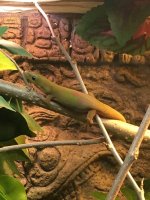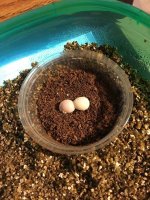Hypancistrus
New member
My female is starting to look a bit gravid to me. I have a few questions about day gecko eggs and incubation. If I find eggs, I assume they can be easily moved-- but are they like crested gecko eggs in that you need to keep them at the same orientation that they were laid in? Or can they be moved more like a chicken egg?
I do not have an incubator. Could I incubate the eggs in the parents cage in their own small "deli cup" container? I assume that if the parents are doing well the eggs likewise would do well at ambient temps/ humidity in the parent cage?
Here is the female this morning. She's starting to look much "chunkier" than she did when I first got her.

I do not have an incubator. Could I incubate the eggs in the parents cage in their own small "deli cup" container? I assume that if the parents are doing well the eggs likewise would do well at ambient temps/ humidity in the parent cage?
Here is the female this morning. She's starting to look much "chunkier" than she did when I first got her.



